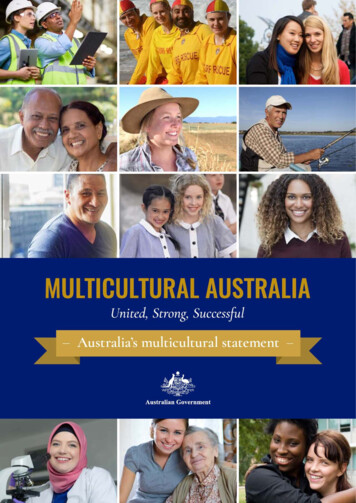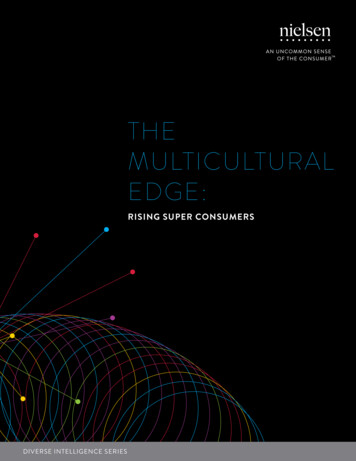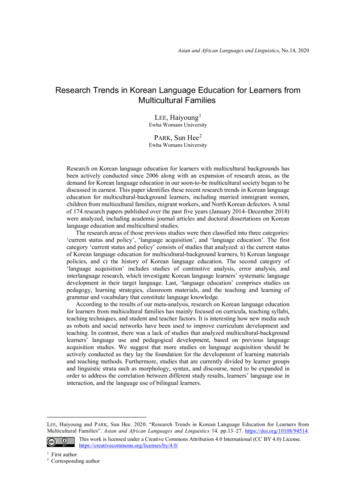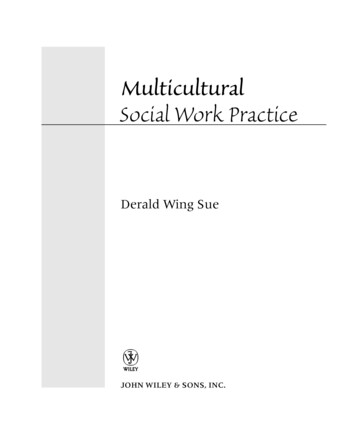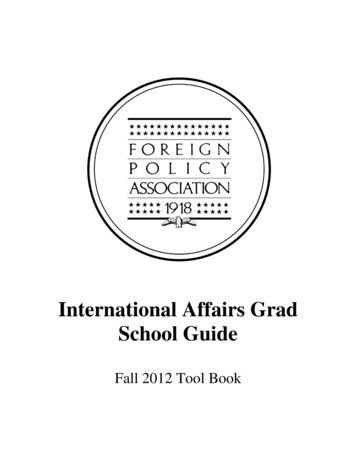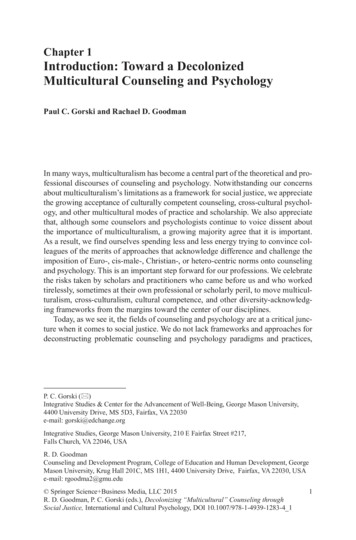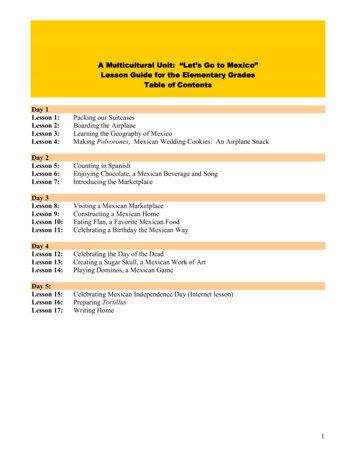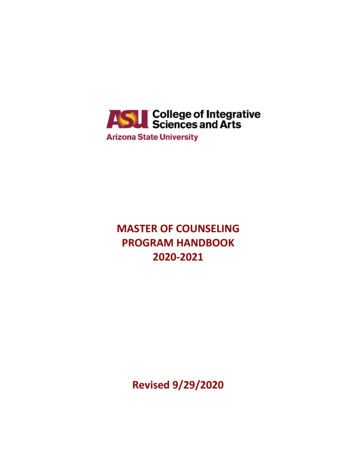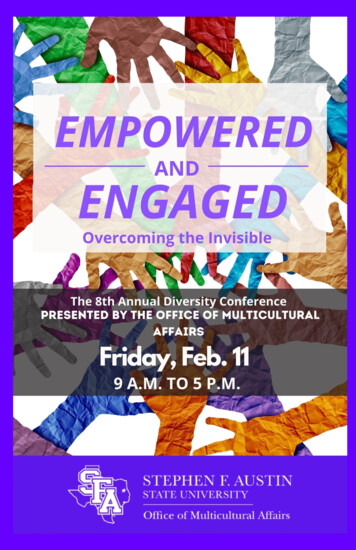
Transcription
The Office of Multicultural Affairs welcomes you tothe Eighth annual Diversity Conference!The Office of Multicultural Affairs is committed to advancing Stephen F.Austin State University's commitment to diversity and multiculturalism. Tocontinue our commitment, The Office of Multicultural Affairs presentsthe Diversity Conference. The Diversity Conference seeks to provide a platform for presenters to share diversity-related work with conference attendees and engage in vital multicultural dialogue.OMA Diversity Conference Committee: OMA CaucusThe Office of Multicultural Affairs Caucus' mission is to advance the areasof diversity, social justice and multicultural awareness and competence onthe SFA campus through dialogue and programming. We strive to create anatmosphere on campus where all faculty, staff and students feel welcomed,respected and heard.Caucus Members Daniel Anguiano – Assistant Professor, School of Art Dr. Lauren Burrow – Associate Professor, Elementary Education Heather Catton – Director, International Programs Dr. Gina Fe Causin – Associate Professor, Human Sciences Dr. Aryendra Chakravartty – Associate Professor, History Crystal Deckard – Academic Advisor, Academic Services Kimberly Deckard – Assistant Director, Office of Admissions Dr. Flora Farago – Associate Professor, Human Sciences Dr. Donna Fickes- Clinical Instructor, Human Sciences Dr. Mary Hawkins – Associate Professor, Kinesiology and Health Scienc esDr. Paul Henley- Assistant Director, Institutional EffectivenessDr. Hyunsook Kang – Associate Professor, Human SciencesJasmine Randolph- Coordinator, Campus RecreationAlex Reisinger – Admissions Counselor, Office of AdmissionsTiffany Rivers – Director, Disability ServicesDr. Sudeshna Roy – Professor, Languages, Cultures and CommunicationDr. Jorge J.D. Salas – Associate Professor, MusicDr. Hollie Smith – Executive Director of Student LifeDr. Sarah M. Straub – Assistant Professor, Education Studies
OMA Mission StatementThe mission of the SFA Office of Multicultural Affairs (OMA) is to create acampus where all students, staff and faculty feel welcome and included. Wecreate networks of support and develop programs for students, staff and faculty that provide meaningful cross cultural interactions and learning experiences that promote respect for diversity. Through our efforts, we strive tocreate a campus climate in which the benefits of multiculturalism, diversityand social justice can be realized.Office of Multicultural Affairs Staff Veronica Beavers – Director Ja’von Long – Assistant Director Kori Lewis – Graduate Assistant Ammy Martinez – Student Ambassador Amya Mears – Student Ambassador La-Meria Seriale – Student Ambassador Chinye Nwaobi – Student Ambassador Josephine Scott – Student Ambassador Miranda Trujillo – Student Assistant Lwito Nkhama – Student AssistantShare your experience using our ce22#WeTheOMA
ScheduleCHECK-IN 8:30 TO 9 A.M.Grand Ballroom entranceNote: All sessions will be held in the Baker Pattillo Student CenterOPENING SESSION 9 TO 9:25 A.M.Room: Grand BallroomKick off the conference with a warm welcome from the OMA! Various speakers will discuss the conference’s purpose, present the land acknowledgement, and highlight the OMA Diversity Conference committee and variousannouncements.EDUCATIONAL SESSION I 9:35 TO 10:25 A.M. Bi-ology: Understanding the B in LGBTQ Room: Multimedia RoomPresenters: Kacee Garner, Graham GarnerAudience: Students, Faculty members, Community and other institutionsThis presentation will focus on the B in LGBTQ queer identities in an attempt to share information, increase visibility and improve allyship. Bisexuals make up 52% of the LGB community but are less visible, less-frequentlystudied and far less open about their sexuality than gay or lesbian individuals. Bisexuals experience higher rates of sexual and intimate partner violence and poorer health outcomes than lesbian, gay or straight individuals.Approximately 11%of Americans acknowledge some level of same-sex attraction, while 8% have engaged in same-sex sexual behavior. Bisexual individuals face substantial stigma, erasure and invisibility as they navigatetheir relationships and identity development. Frequently, they feel neitherstraight enough nor gay enough to belong. Bisexuality is fetishized in mediaportrayals and largely ignored in historical points of view. Bisexuals are subjected to frequent microaggressions and face increased obstacles to comingout. Increasing numbers of youth are self-reporting bisexual or pansexualidentities, making this topic important and relevant for college campuses.
Asian Americans in a COVID-19 WorldRoom: Virtual; Tiered RoomPresenters: Rebecca Lockerbie, Andria Juarez, Alexis Hooper, Gina FeCausinAudience: Students, Faculty members, Community and other institutionsThe Asian and Asian-American community face a multitude of challenges inthe hospitality industry. While some obstacles may be easy to overcome, theissues that COVID-19 brings to the community are far too pervasive to ignore. Our research examines the physical and social violence toward theAsian community developed because of the virus. It also exposes how restaurants in the hospitality industry are affected due to the racism the community is facing. Content analysis was used to determine ways to eradicatethese issues. Overall, awareness of the hostility, and help from organizationsdesigned to support the Asian and Asian-American community will put anend to the discrimination.EDUCATIONAL SESSION II 10:35 TO 11:25 A.M. Fourth-Wave Anti-racism: A heterodox shift in theory and prac-tice for the benefit of humankindRoom: Regents Suite BPresenters: Jason Littlefield, Dr. Erec SmithAudience: Students, Faculty members, Community and other institutionsFourth-Wave antiracism rebukes present-day “anti-racism” efforts popularized by Ibram X Kendi and other 21st century orthodox race scholars.Kendi's third-wave anti-racism centers on political theory that believes theindividual is problematic and removing autonomy is necessary for a healthyand just society. Fourth-wave anti-racism efforts offer no root-cause analysis and/or root treatments for racism. Therefore, if improving human potential, human relationships and working within the framework of a free society are priorities, a shift in thought and practice is needed.This lecture features the architects of fourth-wave anti-racism; Jason Littlefield, SFA alumnus and adjunct professor; and Dr. Erec Smith, associate professor of rhetoric and composition at York College of Pennsylvania. Smithand Littlefield share their professional experiences within the orthodox diversity, equity and inclusion movement, and their research on the intent ofthe movement, and its impact on humanity. Smith and Littlefield will alsodiscuss how they are pioneering fourth-wave anti-racism through their pro-
jects, “Free Black Thought,” and “EmpowerED Pathways.” “Free BlackThought” defies race essentialism by promoting diversity of thought.Through “EmpowerED Pathways,” Smith and Littlefield share their framework for life - Empowered Humanity Theory -with educators, students andcommunity members.This lecture also reveals how present-day anti-racism is contributing to ourdecline in personal well-being and societal division, and how shifting ourpractices will increase personal and societal well-being. Diversity, Equity and Inclusion in the Travel Industry - Miles toGoRoom: Multimedia RoomPresenters: Jennifer Edwards, Gina Fe CausinAudience: Students, Faculty members, Community and other institutionsIn Texas, the travel and tourism industry experienced a shift in the past 100years. Historically, hotels and restaurants were not as open to diverse travelers. As a result, some diverse travelers had to rely on publications like thegreen books to guide them to safe destinations along their route. Now, hotelsand other travel companies can communicate their welcoming environments to diverse travelers through social media outlets and on their website. During this session, attendees will discover the historical importance ofpublications like the green books and they will brainstorm additional waysthe travel industry can focus on the needs of diverse travelers. No Longer Dreamers: Being Undocumented in Higher Educa-tion and Its ImplicationsRoom: Virtual; Tiered RoomPresenters: Maria Cruz, Flor RosiqueAudience: Students, Faculty members, Community and other institutionsUsed as the poster children of immigration reform in the United States, undocumented youth have always had to prove themselves as worthy - worthyof a driver’s license, an education and as humans. With the alternation of enacting and repealing of Deferred Action for Childhood Arrivals, political andsocial turmoil -- along with disappointment -- undocumented youth facemultiple challenges in their lives. 66,000 undocumented students are enrolled in post-secondary education in Texas. Learn from past students aboutwhat it is like to be undocumented the midst of insufficient and/or unavailability of support in institutions of higher education.
DEBREIF SESSION 11:35 TO 12 P.M.Grand Ballroom entranceNote: All sessions will be held in the Baker Pattillo Student CenterLUNCHEON AND KEYNOTE SPEAKER 12 TO 1:15 P.M.Outspoken Bean is Houston's 2021-2023 Poet Laureate. The New Jerseyborn, San Antonio raised, H-Town based military brat was introduced tothe arts and world cultures at a very young age and has not let go of it. "Anenergetic pioneer for poetry, in all its different sizes and shapes, Bean isdedicated to making sure that poets get heard," Emily Hinds of Arts andCulture Magazine wrote of Bean. Bean uses poetry to engage different mediums and institutions to create new and engaging art, such as being thefirst poet to perform on Houston Ballet's main stage with their production"Play." He has also been commissioned to write and perform a nationalcampaign on diversity for Pabst Blue Ribbon and VICE while creating/producing his own festival Plus Fest: the EVERYTHING plus POETRY Festival. In 2008, Bean helped develop Texas' largest youth poetry slam organization and slam team, Meta-Four Houston, with Shannon Buggs and DiverseWorks. In which he stills coaches and uses it as a vehicle today to mentorHouston's youth. He started performing spoken-word in 2005. OutspokenBean is a true renaissance man and culture bearer through poetry, Beanwillingly seeks, finds, collaborates, and creates new ways for people to experience poetry through multiple mediums."An energetic pioneer for poetry, in all its different sizes and shapes,Bean is dedicated to making sure that poets get heard”- Emily Hinds, Arts and Culture Magazine
EDUCATIONAL SESSION 3 1:25 TO 2:15 P.M. “GO OUT THERE AND MAKE IT HAPPEN.”: Voices from GenJacks ofColorRoom: Tiered RoomPresenters: Heeok Jeong, Nika Luu, Cynthia GonzalezAudience: Students, Faculty members, Community and other institutionsBlack Lives Matter commenced as a call to action in response to statesanctioned violence and anti-Black racism. The BLM movement, in “buildinga world where everyone can breathe” has called us to investigate the practices, discourses, policies and laws that are hindrances to inclusive and equitable environments. In order to improve the educational environment, wemust address the concerns and structural inequities impacting our communities, whether it be a classroom, institution or nation. Thus, this inquiryoriented qualitative case study explores the struggles and tools of firstgeneration college students of color in their K-16 schooling processes froma raciolinguistic perspective. Particularly, this presentation will focus on theamplification of the voices of first-generation college students of color, particularly about their struggles and tools in K-16 schools.This presentation will discuss the challenges and struggles of GenJacks ofcolor that the first presenter uncovered through her mentoring experienceswith GenJacks of Black and Latina students. Then, the second presenter, aCambodian American and recent SFA graduate; and the third presenter, aLatina junior student at SFA; will describe and explain the struggles, challenges and successes they experienced in K-16 schools. The presentationwill conclude with implications for policy, pedagogy and teacher and facultymember education. El Salvador's Food ClockRoom: Multimedia RoomPresenters: Zarea CollinsAudience: Students, Faculty members, CommunityNutrition and culture are topics ignored when a country plans its development agenda. The consequences that result are an abandonment of nourishing traditional food, and a combination of diseases caused by declining nutritional content in the consumed food. Topics that are going to be discussedare El Salvador's food culture --specifically its history, staple foods foodmedicine, dietetics and how it has impacted globalization. Additionally, the
presentation will explore the relationship between medical conditions andhow dietitians respond to them. Globalization has negatively impacted ElSalvador's health status, dietary practice, and ingrained poor habits that willbe carried on for generations.EDUCATIONAL SESSION 4 2:25 TO 3:15 P.M. Am I the change or the token? A minority perspective in predomi-nantly white occupationsRoom: Regents Suite BPresenter: Kori LewisAudience: Students, Faculty, Community and other institutionsProfessional development and achievement have become common goals foryoung adults in the United States. This presentation will review differentpredominantly white occupations and the perspectives of minority professionals within them. The minority perspective across a range of age groupswill shed light on issues such as imposter syndrome, tokenism and more.The primary goal of the presentation is to encourage minority professionalsto share their stories and create a network to help prepare the next generation of professionals. Supporting Students with Children and Caregiving ResponsibilitiesRoom: Multimedia RoomPresenter: Heather Olsen Beal, Lauren Brewer, Amanda Rudolph, ChayRunnelsAudience: Students, Faculty, Community and other institutionsHigher education is becoming increasingly diverse in terms of faculty, staffand student race/ethnicity, language, socioeconomic status, educationalbackground (first generation students), gender identity, gender expression,etc. One category of students that is growing in number is students who areparents and/or caregivers. Meeting the needs of this growing student population is a critical diversity, equity and inclusion issue. This session will focus on identifying the unique challenges faced by this growing group of students and will identify ways we can immediately begin to better meet thesestudents' needs on our own SFA campus, as well as identifying longer-rangechanges we can begin working toward.
The Social Impacts of ReligionRoom: Multimedia RoomPresenter: Shanta Scott, Alasia JohnsonAudience: Students and Faculty membersThe beliefs, values and ideas of religious traditions have made significantcontributions to the development of human societies and cultures. The social impacts of religions have been a basic factor of human history in allplaces and times, and remain in our world today. According to Emerson, Monahan & Mirola, religion serves several functions for our society today.These functions include giving meaning and purpose to life, reinforcing social unity and stability,serving as an agent of social control of behavior, promoting physical and psychological well-being, and motivating people towork for positive change. Given the pervasiveness of religion and spirituality throughout people’s lives and cultures, incorporating religion in the practice of social work helps social workers gain a holistic view of the person inenvironment, as well as support the professional mission of promoting satisfaction of basic needs, well-being and justice for all individuals and communities around the world.DEBREIF SESSION 3:25 TO 4:15 P.M.Room: Grand BallroomCLOSING REMARKS 4:25 TO 4:45 P.M.Room: Grand BallroomThank you for attending!
Notes
Notes
Notes
The Asian and Asian-American community face a multitude of challenges in the hospitality industry. While some obstacles may be easy to overcome, the issues that COVID- brings to the community are far too pervasive to ig-nore. Our research examines the physical and social violence toward the Asian community developed because of the virus.




